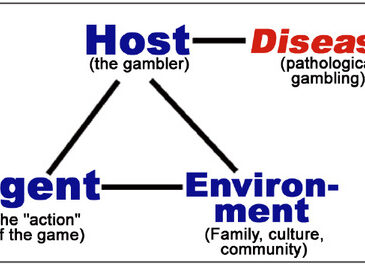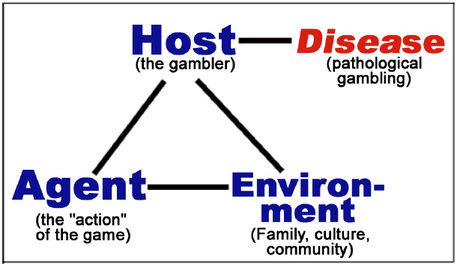Epidemiology can be defined as "the study of the distribution and determinants of disease frequency [1]". Historically, epidemiologists were concerned primarily with infectious diseases such as malaria and tuberculosis. But in recent years, the field has expanded to include the study of psychopathology and social phenomena. That the gaze of epidemiology has fallen on gambling should be of little surprise.
The classic infectious disease model on which much of modern epidemiology is based has been illustrated by Mauser and Kramer (1985)[2], and is presented in the graphic below. The model is reasonably simple, and can be easily applied to a disease such as malaria. In the case of malaria, the host is the infected person, the agent could be a disease-carrying mosquito, and the environment could be a swamp. Zinberg (1984) applied this model to addictive disorders [3]. Can the model also be applied to pathological gambling? Politzer, Yesalis, and Hudak (1992) believe that it can [4].
Modifying the model of Mauser and Kramer, Politzer et al. propose that the ‘host’ is the gambler and that the ‘environment’ is the gambler’s family, culture, and community. But what is the mosquito analogue, or ‘agent,’ for pathological gambling? The authors suggest the "action" of the game – that is, the anticipation and excitement that accompany the wager.
Is the "action" of the game the infectious agent of pathological gambling? There are other possibilities: money, social interaction, free alcohol, and the ambiance of the gambling venue. This idea is further explicated in a forthcoming monograph by Korn and Shaffer, which will appear in the Journal of Gambling Studies [5].
References
[1] MacMahon, B., & Pugh, T.F. (1970) Epidemiology: Principles and methods. Boston: Little, Brown.
[2] Mausner, J., & Kramer, S. (1985) Epidemiology – An introductory text, 2nd edition. Philadelphia: W.B. Saunders.
[3] Zinberg, N. E. (1984). Drug, set, and setting: the basis for controlled intoxicant use. New Haven: Yale University Press.
[4] Politzer, R.M., Yesalis, C.E., & Hudak, C.J. (1992). The epidemiologic model and the risks of legalized gambling: Where are we headed? Health Values: The Journal of Health Behavior, Education, and Promotion, 16, 20-27.
[5] Korn, D., & Shaffer, H. J. (in press). Gambling and the health of the public: adopting a public health perspective. Journal of Gambling Studies.





